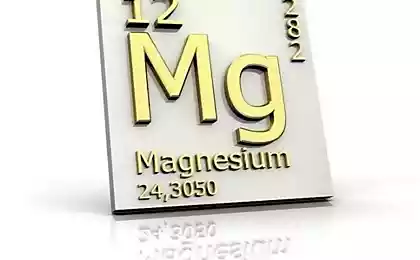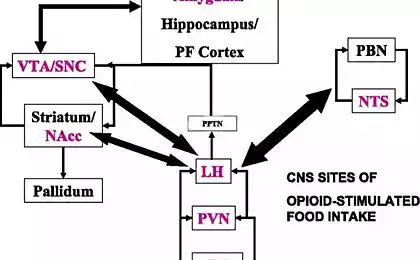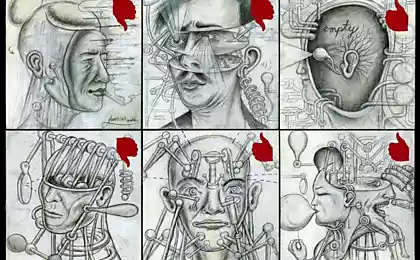495
That's so vague: what is attention deficit disorder
Forty two million three hundred fifty nine thousand two hundred eighty six
© Сharlotte Abramów
Problems with concentration — the scourge of modern society: more and more people complain of fatigue, distractibility and inability to concentrate on an important task. This can be as a result of multitasking and information overload, and the manifestation of specific mental disorders — attention deficit disorder and hyperactivity. The syndrome of deficiency of attention and hyperactivity reveals all the weaknesses of psychiatry as a science: it is difficult to find a more contradictory, vague and mysterious disorder. First, there is a high risk of misdiagnosis, and secondly, scientists are still arguing whether insanity is real or a variant of the norm — and if it does the disease can we assume the full ADHD diagnosis, or is just a set of symptoms may not be United by one cause.
History of research of attention deficit disorder (which received its current name only in the second half of the twentieth century) began in 1902 when the pediatrician George Frederic still, described a group of impulsive, poorly assimilating information from children and hypothesized that this behavior is not related to underdevelopment. The hypothesis was subsequently confirmed — although to explain the reasons of this phenomenon the doctor and could not. 25 years later another doctor, Charles Bradley began prescribing hyperactive children Benzedrine — a stimulant derived from amphetamine. Stimulators proved very effective, although again, for a long time the doctors could not understand the mechanism of their impact on patients. In 1970, American psychiatrist Conan Kornetsky first put forward the hypothesis that the disease may be associated with reduced levels of certain neurotransmitters in the brain, and these drugs help to increase. The first methods of diagnostics of a syndrome, the American psychiatric Association offered only in 1968, and in Russia it was talked about only in the second half of the 1990s — and that without much enthusiasm.

Cautious attitude to the subject can understand: the study of ADHD and development of criteria the diagnosis was accompanied by scandals, even in the 1970s, the creators of the American DSM-4 was accused that their descriptions of the disorder has caused a epidemic of overdiagnosis in children and adolescents. Some doctors and parents chose medications as the path of least resistance: it was easier to stuff the guys hard drugs than to cope with the peculiarities of pedagogical methods. In addition, the amphetamine-type drugs prescribed active and uncontrollable children, sometimes migrated into the Arsenal of their mothers-Housewives: stimulants gave them strength and helped to cope with the housework (the most spectacular horror story on the theme of the consequences of domestic abuse of drugs — the story of the mother of the main character in "Requiem for a dream"). In addition, the criteria diagnosis of the disorder was changed several times, which also caused a flurry of criticism. As a result, the attention deficit disorder has been greatly discredited, and for some time was in the tops "of non-existent diseases".
However, the experience of psychiatrists revealed that the problem, as it is not classificherei, still exists: a certain percentage of the population is experiencing difficulties associated with poor concentration, inability to organize themselves, impulsivity and hyperactivity. Often, these features persist into adulthood and manifest themselves quite strongly to create a person (particularly ambitious) serious problems in school, at work and in personal life. But usually the disorder is perceived by others and by the patient not as a serious disease, but as a manifestation of personal shortcomings. Therefore, most adults with this set of symptoms does not apply to doctors, preferring to strong-willed efforts to deal with his "weak character".
What is it like in the life of a man with Sugendra attention deficit causes patients difficulties in school: a teenager with such a diagnosis, even if he has a high IQ, it is difficult to absorb the material, interact with their peers and teachers. People with ADHD can to immerse yourself in a topic which he is subjectively interesting (though usually not for long — such people tend to frequent change of priorities and interests) and to show great ability, but it is difficult to perform even simple routine work. He has a bad plan, and with a high level of impulsivity to predict even the immediate consequences of their actions. If it is also combined with hyperactivity a teenager turns into a nightmare of a school teacher — it will get poor grades for "boring" subjects, to impress others impulsive antics, to violate the order and sometimes to ignore social conventions (because it will be difficult to focus on the expectations and demands of others).
Previously it was thought that with age, the disorder "resolved" itself — but according to the latest data, approximately 60% of children suffering from ADHD, the symptoms continue to manifest itself in adulthood. The employee, unable to see out the end of the meeting and skipping the important instructions on deaf ears, a talented specialist, disrupting important deadlines, suddenly distracted by a personal project, "irresponsible" partner, unable to organize home life or suddenly pulls a ton of money on some strange whim — they can be not just weak-willed slobs, and people who suffer from a mental disorder.
Problems, diagnostico to various estimates, from this disease suffer 7-10% of children and 4-6% of adults. The popular idea of the patient as only about ADHD impulsive fidget already out of date — modern science identifies three kinds of disorders:
— focusing on attention deficit (when having no signs of hyperactivity, but it's hard to concentrate, prolonged work with the same task and to organize their actions, he is forgetful and easily tired)
with the emphasis on hyperactivity (people overly active and impulsive, but not experiencing significant difficulties with concentration)
— mixed version
According to the American classification of mental disorders DSM-5 diagnosis of "attention deficit\hyperactivity disorder" can be set not earlier than 12 years. The symptoms should be presented in different situations and settings and to manifest strongly enough to significantly affect a person's life.

ADHD or bipolar disorder? One of the problems of diagnostics of a syndrome — that some of the signs of the syndrome overlap with other mental illnesses — in particular, cyclothymia and bipolar disorder: hyperactivity can be confused with hypomania, fatigue and problems with concentration — with symptoms of dysthymia and depression. In addition, these comorbid disorders — that is, a sufficiently high probability to get simultaneously both. In addition, suspicious symptoms may be associated with nasihatname diseases (e.g., severe head trauma or poisoning). Therefore, experts often recommend that those who suspect the syndrome of deficiency of attention, before you turn to the psychiatrists, to undergo routine medical examination.
Gender nuances. Last year in the magazine The Atlantic published an article about how women's ADHD manifests differently than in men. According to the described studies, women with this disorder less likely to show impulsivity and hyperactivity, and often disorganization, forgetfulness, anxiety and introversion.
Edition of the T&P reminds that you should not rely on self diagnosis — if you think you have ADHD, it makes sense to consult a specialist.
Loss controlav the development of ADHD plays a big role genetic factors — if your close relative is suffering from this syndrome, chances are you will put the same diagnosis — 30%. The modern theory of ADHD is associated with functional impairments in neurotransmitter systems of the brain — in particular, with the balance of dopamine and norepinephrine. Dopamine and noradrenaline pathways are directly responsible for the Executive functions of the brain — that is, the ability to plan, an effort to switch between different stimuli, the flexibility to change their behavior depending on the changing environmental conditions and to suppress automatic reactions in favor of a conscious decision (that's what Nobel laureate Daniel Kahneman calls "slow thinking"). All of this helps us to control their behavior. Another function of dopamine is to maintain the "reward system" that monitors behavior, answering the "right" (from the point of view of survival) action pleasant sensations. Disruption of this system affects motivation. In addition, people with attention deficit disorder and hyperactivity can be deviation in serotonin balance. This can cause additional problems with the organization, sense of time, concentration and emotional control.
Disorder or personality feature?Now gaining popularity the concept of neuroarthropathy — approach considering different neurological features as a result of normal variations in the human genome. In the interests of adherents of neuroarthropathy — sexual orientation and gender identity, and some genetically determined mental illnesses, including, autism, bipolar disorder and attention deficit disorder. Some scientists believe that many of the behaviors about which exhibited the diagnosis of ADHD is a natural personality traits do not indicate the presence of unhealthy deviations. However, because such traits make it difficult to function in modern society, they hung the label of "disorder".
Psychotherapist Tom Hartman has developed a bold theory of the "hunter and farmer", which people with ADHD retained the genes of primitive people responsible for the behavior that is optimal for hunters. Over time, mankind went to agriculture, require more patience and "hunting" quality — quick response, impulsivity, susceptibility — were considered undesirable. According to this hypothesis, the problem is only in the production task, and the ability of people with a syndrome "hyperfocusing" — strong concentration on subjectively interesting task, to the detriment of everyone else can be viewed as an evolutionary advantage. However, Hartman's difficult to assume an objective researcher — ADHD diagnosed in his son.
But in any case, this theory makes sense: as one of the most important criteria of mental health — ability to cope successfully with everyday tasks, you can smooth out many problems, specifying field of activities. That is, one where the daily routine and patience play a lesser role and valued "sprint" temperament, ability to improvise, curiosity and the ability to easily switch between the various activities. For example, it is believed that with ADHD you can make a good career in sales or entertainment, in art and "adrenaline" occupations (for example, fireman, doctor, or military). And, you can become an entrepreneur.
How to treat
Medicines.For the treatment of ADHD are still being used a stimulant that contains amphetamine (adderall or dexedrine) or methylphenidate (ritalin). Prescribed drugs of other groups, for example, inhibitors of noradrenaline reuptake (Atomoxetine), gipotenzia (clonidine and guanfacine) and tricyclic antidepressants. The choice depends on the specific symptoms of ADHD, additional risks (the tendency to drug addiction or related mental disorders), and the desire to avoid any side effects (a sample list of "side effects" of different drugs can be viewed here)
Since the Russian psychostimulants firmly settled in the list of dangerous drugs, not even prescription, domestic psychiatrists use Atomoxetine, guanfacine or tricyclics.
Psychotherapy.It is believed that it helps with ADHD cognitive behavioral therapy that, unlike many other psychotherapeutic schools, putting the emphasis on working with the mind, not the subconscious. For a long time this method was successfully used in combating depression and anxiety disorder — and there are now special programs for the treatment of attention deficit disorder. The essence of this therapy is to develop awareness and not let irrational patterns of behavior take over a person's life. Classes help to control the impulses and emotions to deal with stress, to plan and organize their actions and to bring the case to the end.
Nutrition and supplements. You can try to adjust your diet in accordance with the advice of the foreign medicine. The most common recommendation is to take fish oil and avoid spikes of glucose in the blood (that is to say "no" to simple carbs). There are also data showing the relationship between the deficiency in the body iron, iodine, magnesium and zinc, and increased symptoms. According to some studies, little caffeine can help you concentrate, but most experts still suggest not to lean on coffee. In any case, adjustment of the diet — rather "support" than a full-fledged way of dealing with the disorder.

The order of the day. People with ADHD more than anyone else, requires planning and a clear agenda. To compensate for internal problems with organization and time management helps an external "backbone": timers, organizers and to-do lists. Any major projects should be divided into small tasks and advance lay in the plan for periods of rest and possible deviations from the schedule.
Source: theoryandpractice.ru
© Сharlotte Abramów
Problems with concentration — the scourge of modern society: more and more people complain of fatigue, distractibility and inability to concentrate on an important task. This can be as a result of multitasking and information overload, and the manifestation of specific mental disorders — attention deficit disorder and hyperactivity. The syndrome of deficiency of attention and hyperactivity reveals all the weaknesses of psychiatry as a science: it is difficult to find a more contradictory, vague and mysterious disorder. First, there is a high risk of misdiagnosis, and secondly, scientists are still arguing whether insanity is real or a variant of the norm — and if it does the disease can we assume the full ADHD diagnosis, or is just a set of symptoms may not be United by one cause.
History of research of attention deficit disorder (which received its current name only in the second half of the twentieth century) began in 1902 when the pediatrician George Frederic still, described a group of impulsive, poorly assimilating information from children and hypothesized that this behavior is not related to underdevelopment. The hypothesis was subsequently confirmed — although to explain the reasons of this phenomenon the doctor and could not. 25 years later another doctor, Charles Bradley began prescribing hyperactive children Benzedrine — a stimulant derived from amphetamine. Stimulators proved very effective, although again, for a long time the doctors could not understand the mechanism of their impact on patients. In 1970, American psychiatrist Conan Kornetsky first put forward the hypothesis that the disease may be associated with reduced levels of certain neurotransmitters in the brain, and these drugs help to increase. The first methods of diagnostics of a syndrome, the American psychiatric Association offered only in 1968, and in Russia it was talked about only in the second half of the 1990s — and that without much enthusiasm.

Cautious attitude to the subject can understand: the study of ADHD and development of criteria the diagnosis was accompanied by scandals, even in the 1970s, the creators of the American DSM-4 was accused that their descriptions of the disorder has caused a epidemic of overdiagnosis in children and adolescents. Some doctors and parents chose medications as the path of least resistance: it was easier to stuff the guys hard drugs than to cope with the peculiarities of pedagogical methods. In addition, the amphetamine-type drugs prescribed active and uncontrollable children, sometimes migrated into the Arsenal of their mothers-Housewives: stimulants gave them strength and helped to cope with the housework (the most spectacular horror story on the theme of the consequences of domestic abuse of drugs — the story of the mother of the main character in "Requiem for a dream"). In addition, the criteria diagnosis of the disorder was changed several times, which also caused a flurry of criticism. As a result, the attention deficit disorder has been greatly discredited, and for some time was in the tops "of non-existent diseases".
However, the experience of psychiatrists revealed that the problem, as it is not classificherei, still exists: a certain percentage of the population is experiencing difficulties associated with poor concentration, inability to organize themselves, impulsivity and hyperactivity. Often, these features persist into adulthood and manifest themselves quite strongly to create a person (particularly ambitious) serious problems in school, at work and in personal life. But usually the disorder is perceived by others and by the patient not as a serious disease, but as a manifestation of personal shortcomings. Therefore, most adults with this set of symptoms does not apply to doctors, preferring to strong-willed efforts to deal with his "weak character".
What is it like in the life of a man with Sugendra attention deficit causes patients difficulties in school: a teenager with such a diagnosis, even if he has a high IQ, it is difficult to absorb the material, interact with their peers and teachers. People with ADHD can to immerse yourself in a topic which he is subjectively interesting (though usually not for long — such people tend to frequent change of priorities and interests) and to show great ability, but it is difficult to perform even simple routine work. He has a bad plan, and with a high level of impulsivity to predict even the immediate consequences of their actions. If it is also combined with hyperactivity a teenager turns into a nightmare of a school teacher — it will get poor grades for "boring" subjects, to impress others impulsive antics, to violate the order and sometimes to ignore social conventions (because it will be difficult to focus on the expectations and demands of others).
Previously it was thought that with age, the disorder "resolved" itself — but according to the latest data, approximately 60% of children suffering from ADHD, the symptoms continue to manifest itself in adulthood. The employee, unable to see out the end of the meeting and skipping the important instructions on deaf ears, a talented specialist, disrupting important deadlines, suddenly distracted by a personal project, "irresponsible" partner, unable to organize home life or suddenly pulls a ton of money on some strange whim — they can be not just weak-willed slobs, and people who suffer from a mental disorder.
Problems, diagnostico to various estimates, from this disease suffer 7-10% of children and 4-6% of adults. The popular idea of the patient as only about ADHD impulsive fidget already out of date — modern science identifies three kinds of disorders:
— focusing on attention deficit (when having no signs of hyperactivity, but it's hard to concentrate, prolonged work with the same task and to organize their actions, he is forgetful and easily tired)
with the emphasis on hyperactivity (people overly active and impulsive, but not experiencing significant difficulties with concentration)
— mixed version
According to the American classification of mental disorders DSM-5 diagnosis of "attention deficit\hyperactivity disorder" can be set not earlier than 12 years. The symptoms should be presented in different situations and settings and to manifest strongly enough to significantly affect a person's life.

ADHD or bipolar disorder? One of the problems of diagnostics of a syndrome — that some of the signs of the syndrome overlap with other mental illnesses — in particular, cyclothymia and bipolar disorder: hyperactivity can be confused with hypomania, fatigue and problems with concentration — with symptoms of dysthymia and depression. In addition, these comorbid disorders — that is, a sufficiently high probability to get simultaneously both. In addition, suspicious symptoms may be associated with nasihatname diseases (e.g., severe head trauma or poisoning). Therefore, experts often recommend that those who suspect the syndrome of deficiency of attention, before you turn to the psychiatrists, to undergo routine medical examination.
Gender nuances. Last year in the magazine The Atlantic published an article about how women's ADHD manifests differently than in men. According to the described studies, women with this disorder less likely to show impulsivity and hyperactivity, and often disorganization, forgetfulness, anxiety and introversion.
Edition of the T&P reminds that you should not rely on self diagnosis — if you think you have ADHD, it makes sense to consult a specialist.
Loss controlav the development of ADHD plays a big role genetic factors — if your close relative is suffering from this syndrome, chances are you will put the same diagnosis — 30%. The modern theory of ADHD is associated with functional impairments in neurotransmitter systems of the brain — in particular, with the balance of dopamine and norepinephrine. Dopamine and noradrenaline pathways are directly responsible for the Executive functions of the brain — that is, the ability to plan, an effort to switch between different stimuli, the flexibility to change their behavior depending on the changing environmental conditions and to suppress automatic reactions in favor of a conscious decision (that's what Nobel laureate Daniel Kahneman calls "slow thinking"). All of this helps us to control their behavior. Another function of dopamine is to maintain the "reward system" that monitors behavior, answering the "right" (from the point of view of survival) action pleasant sensations. Disruption of this system affects motivation. In addition, people with attention deficit disorder and hyperactivity can be deviation in serotonin balance. This can cause additional problems with the organization, sense of time, concentration and emotional control.
Disorder or personality feature?Now gaining popularity the concept of neuroarthropathy — approach considering different neurological features as a result of normal variations in the human genome. In the interests of adherents of neuroarthropathy — sexual orientation and gender identity, and some genetically determined mental illnesses, including, autism, bipolar disorder and attention deficit disorder. Some scientists believe that many of the behaviors about which exhibited the diagnosis of ADHD is a natural personality traits do not indicate the presence of unhealthy deviations. However, because such traits make it difficult to function in modern society, they hung the label of "disorder".
Psychotherapist Tom Hartman has developed a bold theory of the "hunter and farmer", which people with ADHD retained the genes of primitive people responsible for the behavior that is optimal for hunters. Over time, mankind went to agriculture, require more patience and "hunting" quality — quick response, impulsivity, susceptibility — were considered undesirable. According to this hypothesis, the problem is only in the production task, and the ability of people with a syndrome "hyperfocusing" — strong concentration on subjectively interesting task, to the detriment of everyone else can be viewed as an evolutionary advantage. However, Hartman's difficult to assume an objective researcher — ADHD diagnosed in his son.
But in any case, this theory makes sense: as one of the most important criteria of mental health — ability to cope successfully with everyday tasks, you can smooth out many problems, specifying field of activities. That is, one where the daily routine and patience play a lesser role and valued "sprint" temperament, ability to improvise, curiosity and the ability to easily switch between the various activities. For example, it is believed that with ADHD you can make a good career in sales or entertainment, in art and "adrenaline" occupations (for example, fireman, doctor, or military). And, you can become an entrepreneur.
How to treat
Medicines.For the treatment of ADHD are still being used a stimulant that contains amphetamine (adderall or dexedrine) or methylphenidate (ritalin). Prescribed drugs of other groups, for example, inhibitors of noradrenaline reuptake (Atomoxetine), gipotenzia (clonidine and guanfacine) and tricyclic antidepressants. The choice depends on the specific symptoms of ADHD, additional risks (the tendency to drug addiction or related mental disorders), and the desire to avoid any side effects (a sample list of "side effects" of different drugs can be viewed here)
Since the Russian psychostimulants firmly settled in the list of dangerous drugs, not even prescription, domestic psychiatrists use Atomoxetine, guanfacine or tricyclics.
Psychotherapy.It is believed that it helps with ADHD cognitive behavioral therapy that, unlike many other psychotherapeutic schools, putting the emphasis on working with the mind, not the subconscious. For a long time this method was successfully used in combating depression and anxiety disorder — and there are now special programs for the treatment of attention deficit disorder. The essence of this therapy is to develop awareness and not let irrational patterns of behavior take over a person's life. Classes help to control the impulses and emotions to deal with stress, to plan and organize their actions and to bring the case to the end.
Nutrition and supplements. You can try to adjust your diet in accordance with the advice of the foreign medicine. The most common recommendation is to take fish oil and avoid spikes of glucose in the blood (that is to say "no" to simple carbs). There are also data showing the relationship between the deficiency in the body iron, iodine, magnesium and zinc, and increased symptoms. According to some studies, little caffeine can help you concentrate, but most experts still suggest not to lean on coffee. In any case, adjustment of the diet — rather "support" than a full-fledged way of dealing with the disorder.

The order of the day. People with ADHD more than anyone else, requires planning and a clear agenda. To compensate for internal problems with organization and time management helps an external "backbone": timers, organizers and to-do lists. Any major projects should be divided into small tasks and advance lay in the plan for periods of rest and possible deviations from the schedule.
Source: theoryandpractice.ru























